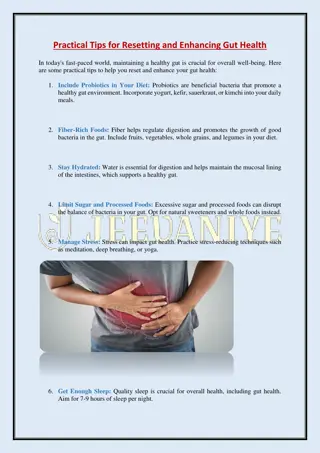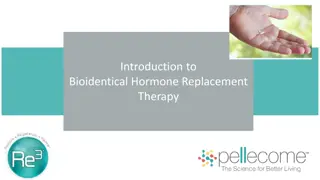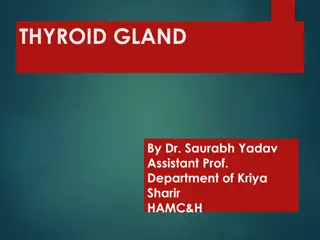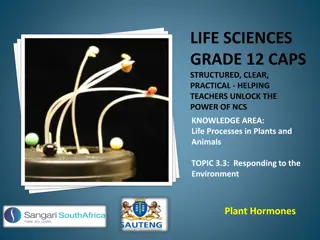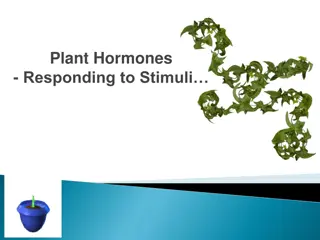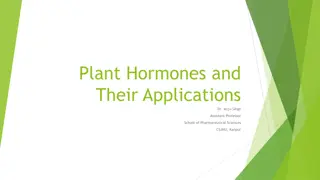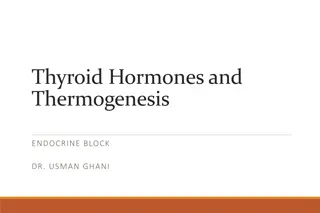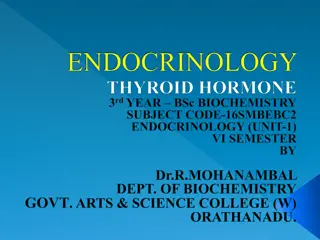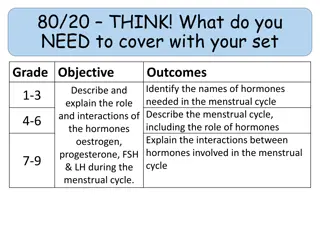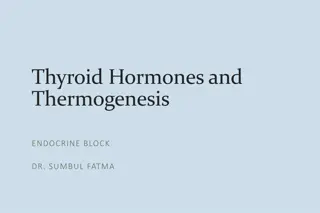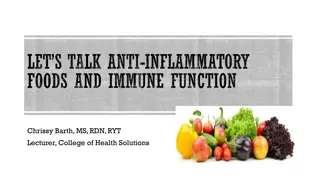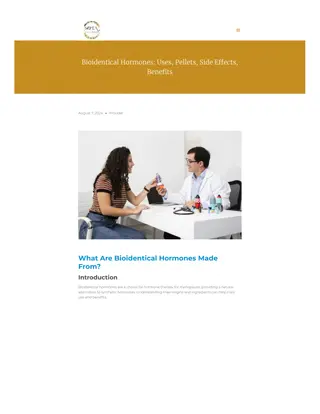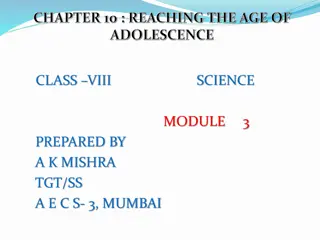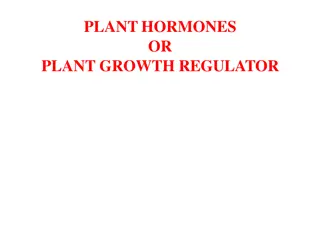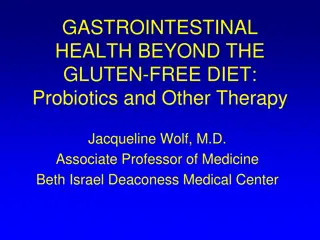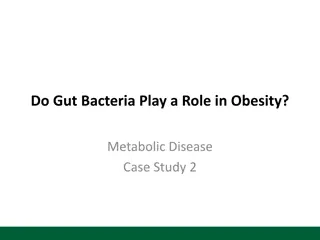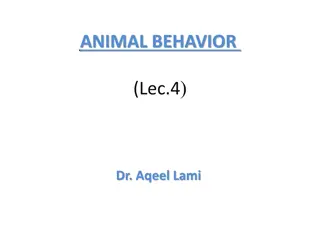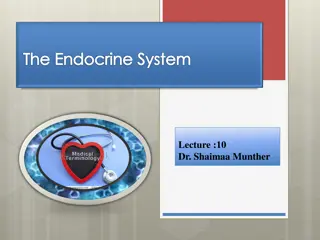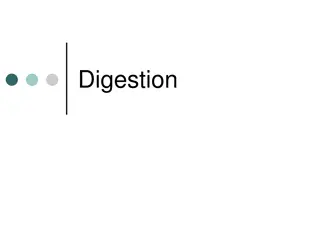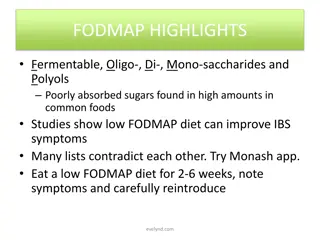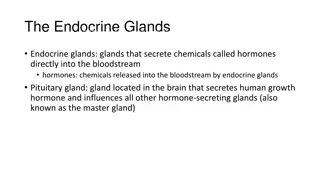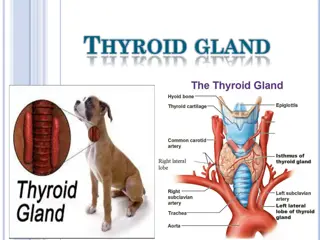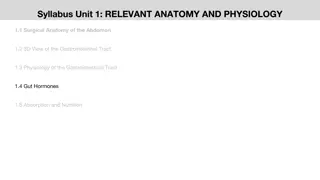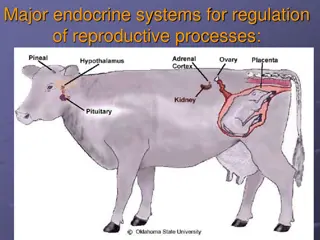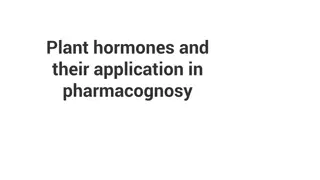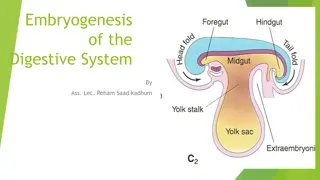Enhancing Cognitive Performance through Gut Microbiome Targeting
Explore cognitive performance, gut microbiome, and physiological responses in high-stress scenarios. Develop targeted inventions like pre- and probiotics for improved cognitive performance.
0 views • 5 slides
Understanding Reproductive Hormones in Males and Females
Reproductive hormones play crucial roles in the body, acting as chemical signals released by endocrine cells. In males, hormones like testosterone, gonadotropin, and estrogen regulate various functions related to reproduction. Similarly, in females, hormones like GnRH, FSH, and LH are essential for
6 views • 16 slides
Understanding Hypothalamus and Pituitary Hormones in Clinical Pharmacology
Peptides and glycoproteins are secreted by the hypothalamus and pituitary, regulating anterior pituitary hormones. Hormones like adrenocorticotropic hormone (ACTH) and corticotropin-releasing hormone (CRH) play crucial roles. Synthetic adrenocorticosteroids have limited the use of corticotropin for
1 views • 28 slides
Oil of Oregano for Gut Health, wildoiloforegano.com
Trusted source found that oregano essential oil; especially from the leaves of the oregano plant is good for skin and gut. It is natural antioxidant can be used externally and internally and has no side effects. \/\/wildoiloforegano.com\/
2 views • 2 slides
Oregano Oil for Gut Health, wildoiloforegano.com
Trusted source found that oregano essential oil; especially from the leaves of the oregano plant is good for skin and gut. \/\/tinyurl.com\/bdz6rp89
2 views • 2 slides
Practical Tips for Resetting and Enhancing Gut Health
Uncover how stress, sleep, and exercise influence gut health. Gain practical strategies to manage stress, improve sleep quality, and incorporate regular physical activity.\n\n
2 views • 2 slides
Understanding Bioidentical Hormone Replacement Therapy
Bioidentical Hormone Replacement Therapy (BHRT) involves using compounded hormones that are chemically identical to the hormones in the human body. Customized compounded bioidentical hormones offer flexible dosing based on individual needs, with growing clinical validation for hormone optimization.
1 views • 12 slides
Nourish Your Gut: Ayurvedic Diet Tips for Improved Digestion
Transform your digestive health with Ayurvedic diet tips designed to nourish and support your gut. Discover the importance of warm, freshly cooked foods and mindful eating practices in Ayurveda. Explore how incorporating pomegranate juice and warm wa
3 views • 6 slides
Understanding the Thyroid Gland: Functions and Hormone Synthesis
The thyroid gland is a vital endocrine gland located below the larynx, responsible for producing thyroid hormones essential for regulating metabolism. This gland consists of follicles lined with follicular cells, producing thyroglobulin and thyroid hormones T3 and T4. Iodine plays a crucial role in
0 views • 40 slides
Understanding Plant Hormones and Their Functions in Plants
Plant hormones play crucial roles in various plant processes such as growth, development, and response to environmental stimuli. Auxins, gibberellins, and abscisic acid are key plant hormones that regulate tropisms, cell division, elongation, flowering, seed germination, and dormancy. Understanding
0 views • 50 slides
Understanding Plant Hormones and Their Role in Growth and Development
Plant hormones are essential chemicals that enable plants to respond to environmental stimuli, regulate growth processes like cell division and elongation, and control key developmental stages such as flowering and fruit development. Key hormones include auxin, gibberellins, and abscisic acid, each
0 views • 34 slides
Understanding Plant Hormones and Their Roles in Growth and Development
Plant hormones, also known as phytohormones, play crucial roles in regulating various cellular processes within plants. They affect gene expression, cellular division, and growth, among other functions. The five major classes of plant hormones include auxins, cytokinins, ethylene, gibberellins, and
0 views • 8 slides
Cell Communication and Signalling in Biology
Cells communicate through extracellular signalling molecules that bind to specific receptors on target cells, leading to changes in cellular behavior. Hormones such as steroid and peptide hormones, neurotransmitters like nor-adrenaline and acetylcholine, play crucial roles in cell signaling. Recepto
0 views • 25 slides
Understanding Thyroid Hormones: Biosynthesis, Functions, and Clinical Implications
This educational material delves into the types and biosynthesis of thyroid hormones, the physiological actions of thyroid hormones, regulation levels, thyroid function tests, goiter, and the distinction between hypo- and hyperthyroidism. It covers the role of thyroid hormones in thermogenesis, meta
0 views • 33 slides
Endocrinological Aspects of Pregnancy: Hormones, Functions, and Synthesis
During pregnancy, endocrinological structures like the corpus luteum and placenta play vital roles in the production of hormones such as progesterone and estrogens. Progesterone maintains pregnancy by controlling essential functions like endometrial differentiation, myometrial quiescence, and local
4 views • 15 slides
Understanding Thyroid Hormones and Their Role in Metabolism
Thyroid hormones, including triiodothyronine (T3) and thyroxine (T4), are essential for regulating metabolism, growth, development, body temperature, and heart rate. They are tyrosine-based hormones produced by the thyroid gland, requiring iodine for synthesis. T3 affects various physiological proce
2 views • 17 slides
Understanding the Hormones in the Menstrual Cycle
Explore the intricate role of hormones in the menstrual cycle, including the names and functions of key hormones like oestrogen, progesterone, FSH, and LH. Learn how these hormones interact and change throughout the cycle, influencing ovulation and menstruation. Dive into activities and resources to
6 views • 19 slides
Understanding Thyroid Hormones and Thermogenesis in Endocrinology
This lecture covers the types, biosynthesis, actions, regulation, and clinical implications of thyroid hormones. It explains the functions of thyroxine (T4) and tri-iodothyronine (T3), their synthesis in the thyroid gland, and their transport in the body. The role of thyroid hormones in thermogenesi
2 views • 30 slides
Understanding Functional GI Disorders: A Comprehensive Overview
Functional GI disorders encompass a range of conditions affecting the gastrointestinal system, such as irritable bowel syndrome and disorders of the gut-brain interaction. These disorders are characterized by no structural abnormalities but are influenced by factors like motility disturbance, viscer
0 views • 42 slides
Understanding Anti-Inflammatory Foods and Immune Function
Our health is closely linked to the gut microbiome, with fiber playing a key role in feeding beneficial gut bacteria. Incorporating anti-inflammatory polyphenols from plant-based sources like fruits, vegetables, and herbs can promote a healthier gut. Additionally, fermented foods act as natural prob
1 views • 8 slides
Bioidentical Hormones - Benefits, Pellets and Side Effects
Benefits, risks, and uses of bioidentical hormones, including pellets, for menopause relief. ingredients and differences. Bioidentical hormones are a choice for hormone therapy for menopause, providing a natural alternative to synthetic hormones. Und
1 views • 5 slides
Understanding Hormones and their Role in the Body
Hormones are chemical messengers that play a crucial role in regulating various metabolic functions in the body. They are transported through the bloodstream to tissues and organs, affecting processes like growth, metabolism, and reproduction. Some hormones have autocrine and paracrine effects in ad
0 views • 25 slides
Understanding Hormones and Reproductive Changes in Adolescence
Changes during adolescence are driven by hormones like testosterone in boys and estrogen in girls, leading to physical developments such as facial hair growth and breast development. Hormones play a crucial role in initiating reproductive functions, with endocrine glands releasing hormones to target
0 views • 19 slides
Understanding Plant Hormones and Growth Regulators
Plant growth regulators, also known as plant hormones, play a crucial role in regulating growth and development in plants. They are organic compounds that act at low concentrations to promote, inhibit, or modify growth processes. The main plant hormones include auxins, cytokinins, gibberellins, absc
1 views • 40 slides
Understanding Gut Health and the Role of Probiotics
Gut health plays a crucial role in overall well-being, with a diverse community of bacteria in the gut contributing to digestion, immunity, and metabolic processes. Probiotics, beneficial microorganisms, can help maintain a healthy gut environment. This presentation by Dr. Jacqueline Wolf explores t
0 views • 31 slides
Understanding Hormones in Implants and Their Relationship to Cancer Risk
Hormones found in implants and naturally in animals and plants can impact estrogen levels, but the connection to cancer risk is complex. This article explores the presence of hormones in food, the concept of nanograms, human estrogen production, and the implications of using implants in beef product
0 views • 33 slides
Understanding the Role of Gut Bacteria in Obesity and Metabolic Disease
Trillions of bacteria in our gut play a crucial role in obesity and metabolic diseases. By analyzing studies on antibiotic effects, bacterial composition, and diet impact, we learn how gut bacteria influence weight gain, energy use, and overall health. Research shows diverse bacterial types affect w
0 views • 16 slides
Plant Growth Hormones and Defense Mechanisms: Understanding Plant Responses to the Environment
Plant growth hormones and defense mechanisms play crucial roles in how plants respond to environmental stimuli such as water, sunlight, gravity, and more. From auxins promoting cell growth to gibberellins stimulating flowering, this presentation educates on the intricacies of plant hormones and thei
0 views • 13 slides
Understanding Plant Hormones and Their Role in Growth and Development
Plant hormones are vital compounds that regulate various processes in plant growth and development. They are mostly organic and can be gases. These hormones are produced in one part of the plant and transported to other parts where they induce physiological effects. The main phytohormones include Au
0 views • 125 slides
Insights into Animal Behavior and Hormones
Explore the fascinating world of animal behavior, from the deception of recognition mechanisms in gulls to Karl von Frisch's experiments on fish sensory abilities. Learn how behavioral assays shed light on animal sensory powers and how hormones play a crucial role in regulating animal behavior. Disc
0 views • 6 slides
Understanding the Endocrine System: Key Concepts and Functions
The endocrine system, consisting of glands that release hormones into the bloodstream, plays a crucial role in regulating various body processes like metabolism, growth, reproduction, and stress response. Key glands include the pituitary, thyroid, pancreas, adrenal, ovaries, and testes, each produci
0 views • 34 slides
Understanding Digestion Process in the Gut
Learn about the intricate process of digestion that takes place within the gut. Explore how food is broken down, absorbed, and transformed into essential nutrients for the body, with a focus on the small intestine's role in absorption. Discover the importance of enzymes, absorption, and waste elimin
0 views • 58 slides
Understanding Low FODMAP Diet and Other Dietary Factors for Gut Health
Low FODMAP diet is a potential solution for managing IBS symptoms by avoiding poorly absorbed sugars. This diet involves eliminating certain carbohydrates found in common foods. Additionally, other factors like stress, gluten/dairy elimination, and various food compounds can impact gut health. Consi
0 views • 6 slides
Understanding How Hormones Interact: The Endocrine System
The endocrine system comprises glands that release hormones into the bloodstream, influencing various bodily functions. Key glands include the pituitary, pineal, thyroid, pancreas, gonads, and adrenal glands, each playing a crucial role in regulating metabolism, growth, stress response, and reproduc
0 views • 5 slides
Understanding the Endocrine System: Hormones, Glands, and Regulation
The endocrine system, comprising glands such as the pituitary, thyroid, pancreas, and more, produces hormones that regulate various bodily functions. These hormones target specific cells with receptors, influencing metabolism, growth, energy usage, and more. By understanding how hormones interact wi
0 views • 12 slides
Understanding the Thyroid Gland: Structure, Hormones, and Function
The thyroid gland, a butterfly-shaped structure located on the ventral surface of the trachea, secretes hormones essential for regulating metabolic rate, growth, and development. It produces hormones like Tetraiodothyronine T4, Triiodothyronine T3, and Calcitonin, which play crucial roles in maintai
0 views • 21 slides
Understanding the Role of Gut Hormones in Regulating Feeding Behavior
The syllabus covers relevant anatomy and physiology related to the gastrointestinal tract, emphasizing the regulation of feeding processes. It discusses the role of gut hormones such as ghrelin, obestatin, cholecystokinin, pancreatic polypeptide (PP), and peptide YY (PYY) in controlling appetite, en
0 views • 7 slides
Endocrine Systems in Reproductive Regulation
The endocrine system plays a crucial role in regulating reproductive processes by secreting hormones that influence cellular activity. This system involves ductless glands like the hypothalamus, pituitary gland, and other endocrine glands working together in a feedback mechanism. Hormones of various
0 views • 19 slides
Understanding Plant Hormones and Their Role in Pharmacognosy
Plant hormones, also known as phytohormones, are essential chemical compounds in plants that regulate various developmental processes. They include auxins, gibberellins, cytokinins, ethylene, and abscisic acid, each with specific functions in growth, reproduction, and response to environmental stimu
0 views • 21 slides
Embryogenesis of the Digestive System: A Detailed Overview
Formation of the gut tube during embryogenesis involves cephalocaudal and lateral folding of the embryo, resulting in the development of the foregut, midgut, and hindgut. The yolk sac and the allantois play key roles in the formation of the primitive gut. As the embryo develops, the vitelline duct a
0 views • 32 slides





